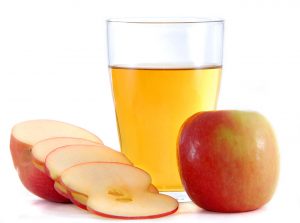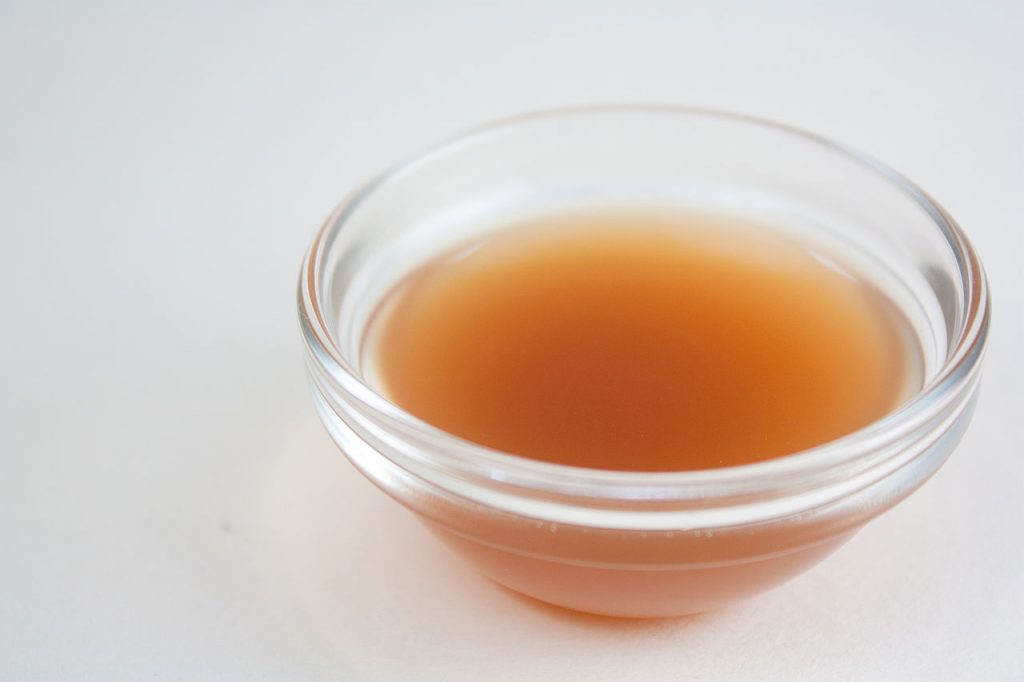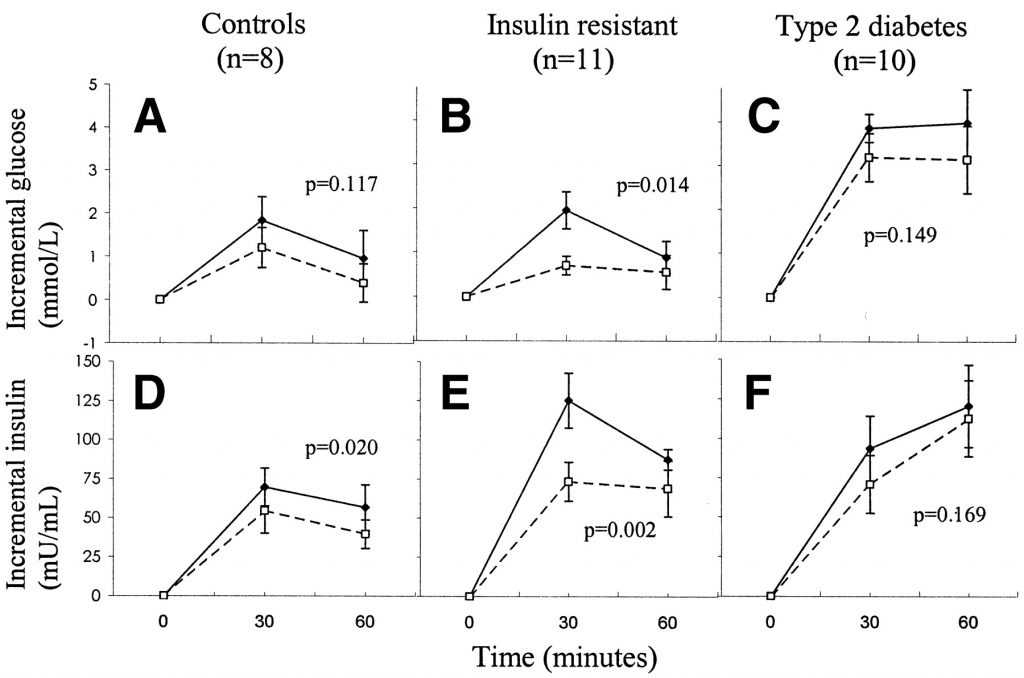Apple cider vinegar might have satiety & blood sugar benefits that make it beneficial for weight loss.

For years, apple cider vinegar has been touted for its numerous proposed health benefits, including claims that it can reduce bacteria and cholesterol levels. In the more recent years, research has focused on its ability to act as a weight loss aid and suggests that it could be an effective fat burner due to its ability to:
- Slow gastric emptying. Apple cider vinegar has been shown to slow the exit of food from the stomach, which promotes a feeling of fullness.
- Block carbohydrate absorption. Consumption of apple cider vinegar prior to meals can decrease post-meal absorption of carbohydrates, leading to stabilized blood sugar levels and potentially reducing appetite.
Overview
Vinegar is created through the process of fermentation, which is when bacteria and yeast break down the sugars in food. Although fermentation initially causes sugars to turn into alcohol, further fermentation past this point leads to the creation of vinegar.
While vinegar can be produced through the fermentation of many different kinds of fruits and vegetables, apple cider vinegar stems from pulverized apples. In addition to its main ingredient – acetic acid – it also includes nutrients such as vitamins B1, B2, B6 and vitamin C.
For centuries, apple cider vinegar has been used to help with stomach problems. In ancient Egypt, it was used as a weight loss supplement and now, many modern studies are focusing on the potential role of apple cider vinegar in weight management programs due to its proposed ability to promote a feeling of fullness, as well regulate blood sugar levels and body mass index (BMI).
Did You Know?
During the 1970s, when the diet craze was in full force, some people claimed that apple cider vinegar – in combination with vitamin B6, kelp and lecithin – could trick your metabolism into burning more fat. No evidence has yet to back up these claims, but in recent years a number of smaller studies have begun to reveal the potential benefits of apple cider as a weight loss aid.

How Apple Cider Vinegar Might Help With Fat Burning
Slowing gastric emptying
Doctors and health professionals use gastric emptying as a measure of how quickly food exits the stomach. However, when gastric emptying slows down enough it can lead to a disorder called gastroparesis. People suffering from gastroparesis possess stomachs that are unable to crush and digest food properly, typically leading to problems in digestion and symptoms including bloating, nausea and a feeling of fullness. One of the most common causes of this condition is diabetes.
Although too much of a delay in gastric emptying can lead to negative effects, a reasonable reduction can lead to a feeling of satiety and some research has suggested that apple cider vinegar can do just this. Ultimately, this can help in weight reduction by minimizing caloric intake. Additional research suggests that the addition of vinegar to meals high in carbohydrates can reduce caloric intake by approximately 200 to 275 for the remainder of the day,1 a finding that could be connected to its aforementioned effects on gastric emptying.
Blocking carbohydrate absorption
Numerous studies have shown that apple cider vinegar might lower blood sugar response during high-carbohydrate meals,2 which promote unstable blood sugar levels more than any other type of meal. Additional research has shown that consuming apple cider vinegar prior to sleep can help regulate waking blood sugar levels in patients with type 2 diabetes.3 The stabilization of blood sugar levels by blocking the absorption of carbohydrates can help in the promotion of satiety and help dieters feel satisfied.
Apple Cider Vinegar Benefits and Popular Uses
Promoting satiety. As mentioned above, many researchers believe that apple cider vinegar can promote a feeling of fullness. This makes it a popular addition to the diets of those looking to lose weight. In fact, one human study that examined obese participants revealed that the consumption of vinegar on a daily basis might reduce fat mass, body weight and blood sugar levels.4
Digestive aid. Since it is acidic, one to two tablespoons of apple cider vinegar could promote digestion by increasing the secretion of hydrochloric acid (HCl) in the stomach. HCl is important for proper digestion as it helps to break down the proteins present in our food and also aids in proper carbohydrate absorption and digestion.
Lower cholesterol. Many animal studies link apple cider vinegar to reduced cholesterol.56. However, thus far no experimental studies have shown evidence of this link in humans.
Diabetes treatment. Research has shown that apple cider vinegar can improve insulin sensitivity as well as regulate insulin and glucose levels in the blood following high-carbohydrate meals. This makes it a popular supplement for those with diabetes as well as individuals trying to achieve a diet the provides stable blood sugar levels and supplements weight loss.
Research
Animal Research
Apple cider vinegar (6 percent w/w) reduces fat profile in normal rats and those with diabetes
After inducing diabetes in male rats of the Wister breed using a streptozotocin injection, researchers fed the diabetic rats and a normal control group animal food that was supplemented with apple cider vinegar (six percent w/w) for a period of four weeks. Measurements of HbA1c (glycated haemoglobin), FBG (Fasting Blood Glucose) and fat profiles were conducted and revealed that vinegar reduced glycated haemoglobin in rats with diabetes. In addition, it increased HDL-c (high-density lipoprotein-cholesterol) and decreased LDL-c (low-density lipoprotein-cholesterol) in normal rats. Rats with diabetes in the apple cider vinegar group also experienced a decrease in TG (serum triglyceride) and spike in HDL-c levels.
- The results suggests that the consumption of apple cider vinegar in rats can reduce fat levels in both normal rats and those with diabetes “by decreasing serum TG, LDL-c and increasing serum HDL-c,” suggesting that it could pose benefits for the management of diabetes.7
Human Research
To determine the effects of apple cider vinegar on the rate of delayed gastric emptying in patients with diabetes, researchers conducted a crossover trial on 10 patients with both diabetic gastroparesis, a disorder that causes delayed gastric emptying, and type 1 diabetes. The GER (gastric emptying rate) was determined using medical ultrasound on patients in order to measure the change in the distal lining of the stomach’s cross-sectional region. These measurements were taken fifteen and ninety minutes after the patients consumed 200 milliliters of water with 300 grams of rice pudding or 30 milliliters of apple cider vinegar along with 200 milliliters of water and 300 grams of rice pudding. One week prior to the first meals, participants consumed 200 milliliters of water daily prior to breakfast. During the two-week time period prior to the second meals, the same participants consumed 200 milliliters of water with the addition of 30 milliliters of vinegar each day prior to breakfast. The data showed that gastric emptying rates were significantly lower when apple cider vinegar was added to the diet.
- The researchers conclude that in patients with diabetes mellitus that are dependent on insulin and also suffer from diabetic gastroparesis, vinegar acts “by reducing the gastric emptying rate even further,” something that they believe could be a negative factor in terms of blood sugar management.8
Oral sodium acetate and acetic acid (1 gram) could effect ketosis and influence blood sugar levels
To determine the effects of acetic acid and sodium acetate – both obtained from vinegar – on blood sugar levels and the response of acetate to food in humans, researchers gave 5 individuals 6 meals in a randomized order. Each meal included 100 grams of lettuce topped with olive oil, one gram of acetic acid (consumed as vinegar) with olive oil, or sodium acetate (from vinegar) with sodium bicarbonate and olive oil. In addition, on three separate occasions participants were challenged to eat 50 grams of carbohydrates in the form of standard white bread. Before and ninety-five minutes after the meals, concentrations of both acetate and glucose were measured. In four subjects that consumed bread, medical ultrasound was used to determine gastric emptying measurements. The results revealed that although no differences were seen in the groups that consumed bread in terms of gastric emptying, both blood sugar and acetate response in all participants that consumed acetic acid as vinegar were significantly decreased in comparison to the sodium acetate participants.
- The researchers suggest that the results point to differences in the effects of oral consumption of sodium acetate and acetic acid on ketosis and suggest that the using vinegar as salad dressing is enough to significantly influence “the glycaemic response to a mixed meal in normal subjects by a mechanism related to acidity but not to gastric emptying.”9
Vinegar reduces post-meal insulin and glucose responses
A team of researchers analyzed the blood of 10 healthy participants (3 men and 10 women) for insulin, glucose and paracetamol following meals consisting of white bread and white bread with vinegar to determine the effects of acetic acid (in the form of vinegar) on post-meal insulin and glucose responses. Paracetamol was utilized as an indicator for a connection between this proposed process and the gastric emptying rate. The results revealed that acetic acid (in the form of vinegar) led to a significant reduction in post-meal insulin and glucose responses following a high-starch meal. Furthermore, the paracetamol levels suggest that this process likely reduced the gastric emptying rate
- The researchers believe that foods with vinegar and other organic acids added to their composition “should preferably be included in the diet in order to reduce glycaemia and insulin demand.”10
Researchers examined the effects of the addition of vinegar and cold storage on the insulin and blood sugar responses of thirteen participants following the consumption of a meal consisting of potatoes. Four types of meals were used in the study: potatoes boiled recently (eight degrees Celsius, twenty-four hours), potatoes that were boiled and placed in cold storage (eight degrees Celsius, twenty-four hours), potatoes that were boiled and placed in cold storage (eight degrees Celsius, twenty-four hours) with vinegar sauce added (28 grams of white vinegar and 8 grams of olive oil) and a control meal consisting of white bread. Participants were served the meals in a randomized order as breakfast and after fasting the night prior. The results showed that cold storage, as well as the addition of vinegar to the potatoes, can reduce the high insulin and blood sugar responses typically connected to these kinds of meals.
- The researchers claim that both cold storage and the addition of vinegar might have beneficial effects on blood sugar, with the data suggesting that “the high glycaemic and insulinaemic features commonly associated with potato meals can be reduced by use of vinegar dressing and/or by serving cold potato products.”11
To determine the effect of acetic acid (in the form of vinegar) on satiety, as well as post-meal glucose and insulin responses, researchers examined the dose-response curve of the blood of twelve participants. Meals consisted of white bread (fifty grams of carbohydrates) and 3 vinegar levels: eighteen, twenty-three and twenty-eight millimoles of acetic acid. Each meal was served in a a random order following a fast the night prior. A meal of white bread with no vinegar served as the control meal. The blood samples, which were conducted over the course of 120 minutes, revealed that thirty minutes following the meal, insulin and glucose levels were the highest. However, these responses decreased as levels of acetic acid increased. Furthermore, ratings of fullness increased along with levels of acetic acid.
- The findings suggests that adding vinegar to meals consisting of white bread can decrease post-meal insulin and glucose responses and promote feelings of fullness, indicating “an interesting potential of fermented and pickled products containing acetic acid.”12
Vinegar could increase insulin sensitivity in people with type 2 diabetes or resistance to insulin
In order to determine the effects of vinegar on insulin sensitivity in patients with diabetes, researchers examined patients with type 2 diabetes, as well as eight controls that were sensitive to insulin and eleven that were not. Participants either consumed vinegar (twenty grams of apple cider vinegar, forty grams of water and 1 tablespoon of saccharine) or a placebo. Two minutes later, they were provided a meal consisting of orange juice and a white bagel with butter. One week later, a crossover trial was conducted and blood sampling was conducted thirty and sixty minutes following the meal to determine insulin and glucose levels. The data revealed that the consumption of vinegar increased sensitivity to insulin post-meal in subjects resistant to insulin, as well as in participants with type 2 diabetes. Furthermore, vinegar decreased fluctuations in insulin levels in controls and reduced fluctuations in insulin and glucose in the group with insulin resistance.
- The researchers suggest that vinegar can “significantly improve postprandial insulin sensitivity in insulin-resistant subjects,” and suggest that future studies should continue to examine the beneficial effects of vinegar in patients with diabetes.13

Dosage for Fat Burning
At this time, there is not enough research to determine the exact does of apple cider vinegar most effective for fat burning. However, here are some dosages from studies that have shown effective results:
- 1 tablespoon (15 grams) to 2 tablespoons (30 grams) led to decreases in weight and belly fat over a period of twelve weeks
- 20 grams prior to a high-carbohydrate meal increased insulin sensitivity in patients with type 2 diabetes
- 28 grams lowered post-meal blood sugar and insulin responses
- 2 tablespoons (30 grams) prior to sleep regulated morning blood sugar levels in type 2 diabetes patients
How to Use Apple Cider Vinegar
Straight. If you can handle the acidity of it, apple cider vinegar can be taken straight. For those that want something a little more palatable, take a look at the other options below.
Mixed with honey. This mixture has been used for years and the addition of honey adds a sweet kick that makes the vinegar much easier to take down.
Salad dressing. Two tablespoons of apple cider vinegar in your salad dressing is a great way to incorporate it into your meals. Mix it with lemon juice and avoid using oil in your dressing for the best results.
Diluted in water. Two tablespoons with a glass of water is also an effective method of consumption that makes the acidity a bit easier to handle.
Side Effects
Consumption of apple cider vinegar is considered to be fairly safe, although consuming eight ounces per day over a long period of time could lead to low potassium levels and osteoporosis. Pregnant women should avoid apple cider vinegar supplements due to the lack of information on its safety during this time and those with diabetes should monitor blood sugar levels closely and communicate with their doctor in regards to how much they’re taking.
Available Forms of Apple Cider Vinegar
Apple cider vinegar has been used for years for its many proposed health benefits and the supplement industry has caught on – it is available in numerous forms, all of which are listed below.
- Liquid. Most common form, consists of vinegar fermented from crushed apples.
- Pills/Tablets. Although the simplest and most convenient way of consuming apple cider vinegar, pills and tablets are also the most unreliable – label claims, acid content and pH vary greatly depending on the brand.
- Powder. Powder is easy to dilute to the strength that you want, although its processed nature means that it lacks the benefits of liquid vinegar.
Supplements in Review Recommendation
- Apple cider vinegar, 30 grams (2 tablespoons) in liquid form for fat burning
Apple cider vinegar shows promise for helping aid weight loss, although more research into the area is still needed. Still, evidence of its benefits on regulating blood sugar levels, reducing gastric emptying and promoting satiety ultimately make it worth a try if you’re trying to lose weight, but other options such as caffeine are more well-documented in terms of their benefits for weight loss.
30 grams (2 tablespoons) is the most common dosage observed successful studies. Liquid is the most natural and reliable form to use and also the most commonly used in studies, so we recommend that you stick to this form and avoid pills, tablets and power.
References
Leave a Reply